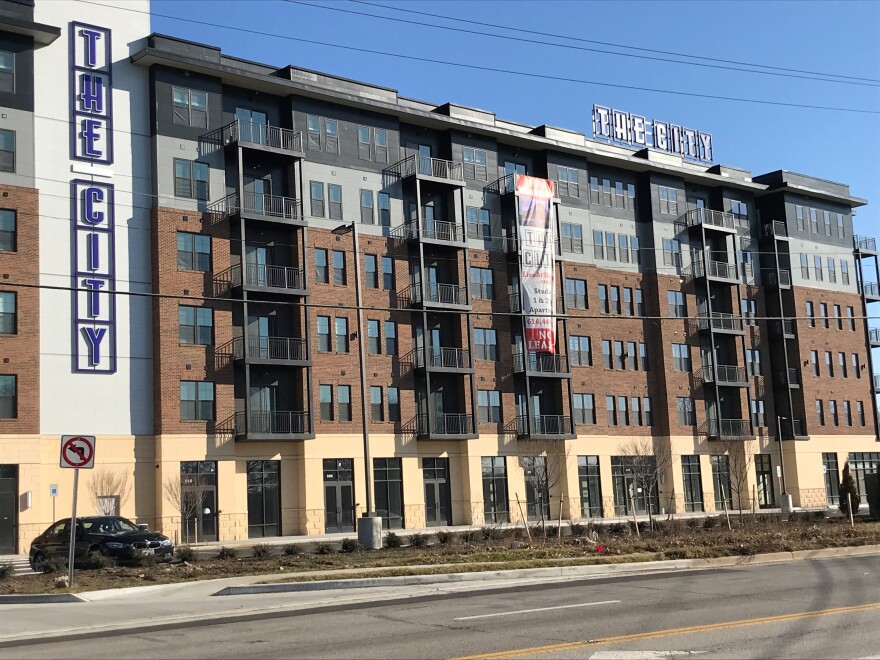On a Wednesday morning, the parking lot in front of Alliance Data's headquarters near Easton is about a quarter full of cars. When pandemic restrictions took effect last March, the loyalty and marketing services company shrunk its primary office space from three buildings to one.
Alliance Data also eliminated its Whitehall and Westerville work sites.
“We had to move really quickly last march to move 96% of our workforce home who were traditionally in the office,” says Brandy Sullivan, vice president of human resources.
Sullivan says the pandemic made the company realize employees can accomplish their work as effectively when they're remote.
“I think that COVID really prompted us to really think about it differently,” Sullivan says. “And surveying our associates, as I mentioned before, really prompted us to think about, 'Hey, we’ve proven all these people are capable of working from home, so let’s get really thoughtful and intentional about how we decide to return people.'”
With the pandemic’s end hopefully in sight, a number of Central Ohio industries are considering if "work from home" will become permanent, or another part of normal operations. What they decide will have big consequences for commercial real estate.

Alliance Data has shed nearly 450,000 square feet of office space. That is more than half of the total space once used by its staff of 3,100.
About half of the workers at Alliance Data are expected to return to the office in July. Like many Ohio students are already doing, those employees will work in a hybrid model, spending some days at the office and others working from home.
It's not the only company considering shrinking its physical space. Commercial realtor Skip Weiler, of the Robert Weiler Company, says that calls from businesses wanting to lease retail space are down 35% from last year.
However, Weiler cautions it's too early to know if this is a trend.
“Either they can’t give up the space or they don’t want to give it up yet, because they don’t know for sure only 20% of their workforce is coming back,” Weiler says. “They’re afraid to make a decision because they don’t know.”
When existing leases expire, Weiler says he’ll work to maintain them even on a month-to-month basis. He understands that some businesses are falling behind again, after Payment Protection Program money ended. The federal program, created by Congress' first coronavirus relief package last spring, had helped some businesses weather the early part of the pandemic and shutdowns.

The pandemic has already affected the Robert Weiler Company's future developments. "The City," an apartment and retail project near Ohio State’s main campus, is 95% completed, but Weiler worries higher lumber costs could make similar projects too costly.
“We have a condo project we were looking at starting, and we put that on hold,” says Weiler. “We thought the cost would come down in December. We put it on hold probably in September, because the costs were so high, thought they would come down, and it started to dip a little, then they went back up higher.”
CoverMyMeds, on the other hand, didn't let COVID-19 halt construction of their new $240 million headquarters in Franklinton. The health care software company has stuck to its original plans for a two-building campus.
Most of their 1,500 employees work in Columbus, and senior vice president of operations Chrissy Hand says they expect to move in this summer.
“Despite the pandemic, we really have been able to stay committed to that vision of a destination office environment, where staff can come to collaborate and have tools at their disposal when they need to, but then continue to work from home when they need to as well,” Hand says.

Columbus’ industrial market continues to show growth. CBRE, which specializes in commercial real estate services, reports that sector ended 2020 in a positive mode. The vacancy rate stood at 4.9%, about where it was before the pandemic.
CBRE managing director Michael Copella says developers broke ground on 8.3 million square feet of industrial space at the end of last year.
“The biggest trend we’re seeing in industrial real estate in Central Ohio is the demand fueled by e-commerce, and that demand means that tenants are increasingly taking large amounts of industrial space speculative, even before the buildings are being built, at historically high rental rates,” Copella says.
While e-commerce businesses more easily weathered the pandemic, Copella says that retail and hospitality sectors – especially restaurants and food outlets who saw their seating capacity and hours reduced – weren't so lucky.
As more Ohioans get vaccinated, real estate agencies are optimistic office occupancy will increase again, and that will benefit brick-and-mortar shops. But a full recovery in office, retail space and hotels may not happen until sometime in 2022, or beyond.
“The hard part for us right now is, again, is just the fact that you have every company doing something a little bit differently, so it’s hard to say exactly what that’s going to look like,” Copella says.
What questions do you have about how COVID-19 has affected Ohio? Ask below and WOSU may answer as part of our series A Year Of COVID.
_





